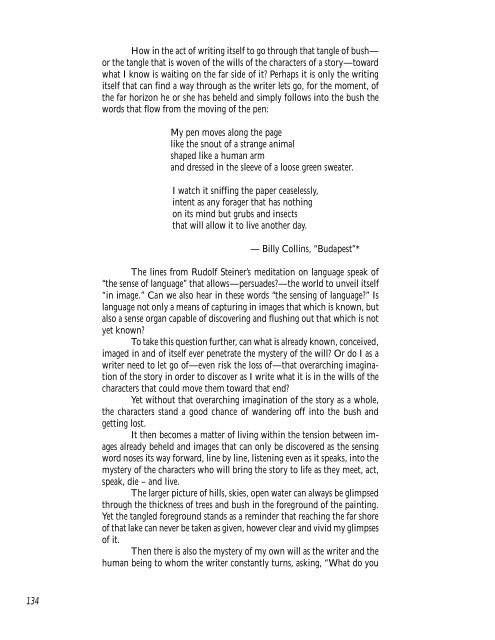Colloquium on English - Research Institute for Waldorf Education
Colloquium on English - Research Institute for Waldorf Education
Colloquium on English - Research Institute for Waldorf Education
You also want an ePaper? Increase the reach of your titles
YUMPU automatically turns print PDFs into web optimized ePapers that Google loves.
134<br />
How in the act of writing itself to go through that tangle of bush—<br />
or the tangle that is woven of the wills of the characters of a story—toward<br />
what I know is waiting <strong>on</strong> the far side of it? Perhaps it is <strong>on</strong>ly the writing<br />
itself that can find a way through as the writer lets go, <strong>for</strong> the moment, of<br />
the far horiz<strong>on</strong> he or she has beheld and simply follows into the bush the<br />
words that flow from the moving of the pen:<br />
My pen moves al<strong>on</strong>g the page<br />
like the snout of a strange animal<br />
shaped like a human arm<br />
and dressed in the sleeve of a loose green sweater.<br />
I watch it sniffing the paper ceaselessly,<br />
intent as any <strong>for</strong>ager that has nothing<br />
<strong>on</strong> its mind but grubs and insects<br />
that will allow it to live another day.<br />
— Billy Collins, “Budapest”*<br />
The lines from Rudolf Steiner’s meditati<strong>on</strong> <strong>on</strong> language speak of<br />
“the sense of language” that allows—persuades?—the world to unveil itself<br />
“in image.” Can we also hear in these words “the sensing of language?” Is<br />
language not <strong>on</strong>ly a means of capturing in images that which is known, but<br />
also a sense organ capable of discovering and flushing out that which is not<br />
yet known?<br />
To take this questi<strong>on</strong> further, can what is already known, c<strong>on</strong>ceived,<br />
imaged in and of itself ever penetrate the mystery of the will? Or do I as a<br />
writer need to let go of—even risk the loss of—that overarching imaginati<strong>on</strong><br />
of the story in order to discover as I write what it is in the wills of the<br />
characters that could move them toward that end?<br />
Yet without that overarching imaginati<strong>on</strong> of the story as a whole,<br />
the characters stand a good chance of wandering off into the bush and<br />
getting lost.<br />
It then becomes a matter of living within the tensi<strong>on</strong> between images<br />
already beheld and images that can <strong>on</strong>ly be discovered as the sensing<br />
word noses its way <strong>for</strong>ward, line by line, listening even as it speaks, into the<br />
mystery of the characters who will bring the story to life as they meet, act,<br />
speak, die – and live.<br />
The larger picture of hills, skies, open water can always be glimpsed<br />
through the thickness of trees and bush in the <strong>for</strong>eground of the painting.<br />
Yet the tangled <strong>for</strong>eground stands as a reminder that reaching the far shore<br />
of that lake can never be taken as given, however clear and vivid my glimpses<br />
of it.<br />
Then there is also the mystery of my own will as the writer and the<br />
human being to whom the writer c<strong>on</strong>stantly turns, asking, “What do you

















